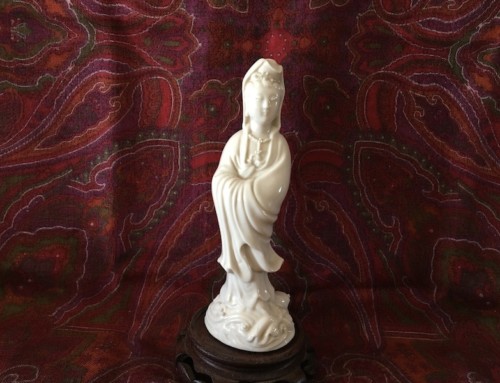…continued from – What We Don’t Know Can Hurt Us
As children, we learned to fear the mythical bogeyman. But time passes and we outgrow our childish fears. As adults, we give no thought to bogeymen, not realizing that we’ve co-opted them. Almost without our knowing it, they begin to appear in the form of pride, jealousy and anger. These bogeymen rob us of our natural inner peace and serenity.

Three Joyous Children
Pride, jealousy, anger: the three bogeymen of serenity. They appear without warning wherever there’s an imbalance of power, which means that in nearly every work situation these bogeymen are always on call, ready to pounce. There are employers (the ones with the power) and employees (those subject to the power). There are managers, bosses and supervisors—all with some degree of authority, power and control. And then there are the subordinates, workers and assistants—all subservient to the powers that be. But certainly our bosses have bosses, and even the top dog has to answer to someone, if only the shareholders.
There are very few (I would argue none at all) who have absolute power, so the issue of power and control is relative and affects us all. But our apparent lack of power often incites the three bogeymen, and once they’re in charge we become completely powerless. We give away our power as we convince ourselves that we are asserting it—a big-time delusion that many of us suffer. Marie’s story shows us how these three bogeymen, when they go on a rampage, can take us hostage and turn us into creatures that betray our true nature.
Marie’s Story
Marie is one of four executive assistants to the CEO of a major organization. She works directly for this CEO, but her work supervisor is one of the other three assistants. Marie loves her job. She has much autonomy, many fringe benefits and great respect and admiration for the CEO. But the way Marie feels about her supervisor, Diane, is another story. Marie’s pride, jealousy and anger were recently activated and created such a raging emotional storm that Marie was ready to quit this job she so loves. You probably won’t be surprised to hear that the trigger for this was a small and seemingly insignificant occurrence.
Marie’s office is separated from Diane’s by the CEO’s sprawling office quarters, so throughout each day, unless they make a point of it, they rarely see each other. But Marie is self-motivating and doesn’t need or want constant supervision, and according to her Diane isn’t much of a manager anyway, so the physical arrangement suits them both. Marie’s position affords her a look at nearly every piece of paper that floats in and out of the office—and there’s a great deal of it. One bit of information she wishes had never come to her attention was the amount of Diane’s previous year’s bonus. Marie did not get a bonus, so the jealousy bogeyman took special note and tucked it away for future reference. Marie’s position in the company did not qualify her for a bonus, but this fact did nothing to diminish her jealousy. Diane has been Marie’s supervisor for nearly fifteen years and Marie has never respected Diane’s managerial style. So the bonus really stuck in her craw and fed her resentment.
Recently Marie and the other two assistants decided that they wanted to attend a benefit concert that the CEO was sponsoring. Marie called the cosponsor to ask for three tickets. They were often given tickets to events, one of the perks of the job, but this event was special and so they had to make a specific request. Marie decided not to ask Diane if she wanted to go, justifying it with the thought that Diane never attends such events anyway, so there was no need to ask.
There were a few things going on here that Marie didn’t see until much later, after it all blew up. Marie’s jealousy, pride and anger were at work convincing her that she needn’t ask Diane or even tell her about it. Marie wanted to go, period. She thought that if she asked her about it, Diane would not want to go herself, and would tell Marie that she and the other women shouldn’t go either, that it was inappropriate to ask for free tickets. Since Marie wanted to go, her desire set the following in motion.
She made the call. She got the tickets. No problem. The cosponsor asked if there was anyone else who wanted a ticket. Marie said no, at that moment not heeding the inner voice that said maybe she should ask Diane. The next day the cosponsor called Diane, told her of Marie’s call and asked if she’d like a ticket. It turned out that Diane did want to go. She later let it be known to one of the other assistants that she was completely embarrassed by that phone call and that Marie had undermined her authority by asking for the tickets, which caused her great upset.
Marie heard of this on Friday and spent the weekend sorting through it all. At first she was stubbornly defiant. Her anger blurred her vision. She could see nothing clearly. In her mind she did nothing wrong, a statement that became a mantra as she struggled toward peace of mind. She did not want to face Diane’s wrath (notwithstanding the fact that in all the years she knew her, Diane had never exhibited wrath.) Her pride kicked in, and she decided that she couldn’t and wouldn’t apologize. In her mind she did nothing wrong. Then the jealousy spread—the money Diane made, the position she had—and Marie was ready to quit her job. Marie ranted and raved for a while, getting it all out, spilling her guts to friends. She did not want to go back to the office on Monday.
At the end of the weekend, having talked about it, written about it, prayed about it and taken advice about it, Marie was ready to hear her own truth. She was ready to be responsible and face up to what she had to do. Once her anger died down she was able to see how defiant she could be. In not asking Diane, even after her inner voice told her to, she saw how her anger and jealousy controlled her. She hadn’t asked Diane because she didn’t want to give Diane the opportunity to exert her power over Marie and deny her a ticket. So rather quickly she was able to see that she owed Diane an apology for not asking her in the first place. But her angry defiance was still engaged as she said: “But I’ll be damned if I’m going to apologize and then stand there and be subjected to her scolding as she tells me how embarrassed she was and what a naughty girl I was. I just can’t do that. I’ll apologize and then leave. That much I can do.”
What it took Marie another two days to see was the real issue underlying it all: the question of who is in charge. Because of her autonomy, her relationship with the CEO and her lack of respect for Diane’s management skills, Marie forgot that, whether she likes it or not, Diane is her boss. It is not up to Marie how the department is run. It is up to Diane. And Marie finally realized that what she had to apologize for was going over Diane’s head and making the phone call requesting the tickets before consulting with her. The issue was not about whether or not Diane wanted to go. Once Marie saw the real issue and accepted her responsibility, she felt much better. She was able to accept the fact—because it is indeed a fact—that Diane is her boss and she must answer to her whether she agrees with Diane’s style or not. It is not her job to decide how the office is run. It is her job to do her job and to respect the flow of authority.
So Marie apologized to Diane without carrying in any bogeymen. She was humble and sincere. Diane, of course, was grateful for Marie’s honesty and did not berate her and go on about her own embarrassment. She was gracious. They both were. Marie didn’t quit her job; she still loves it and has adopted a completely new and different attitude toward Diane and her shortcomings as a boss. Somehow they are not so important anymore.
And after working together for so many years, Diane and Marie are beginning to change their relationship as a direct result of this incident. A few weeks after Marie cleared the air with Diane, Diane apologized to Marie for something completely unrelated to the above incident. According to Marie, this is a “never-before occurrence, which I think illustrates the powerful changes that occur when we (with the help of friends) venture out of our comfort zone.” Surprising things happen when we’re open and honest with ourselves and others.
_________________________________________________
- How do the three bogeymen—pride, anger and jealousy—figure into your daily work life? Write about this.
- Is there some incident with your boss that you have not forgotten and are still stubbornly holding onto? Can you just for a moment forget your boss’s actions and focus exclusively on your own? How did you behave? How would you have liked to behave? Write about this. What conclusions can you draw after looking objectively at the situation? Write them down. And if you are ready, take the actions you feel would bring some peace of mind.
- How many times a day, a week, do you say to yourself or someone else: “I can’t stand my job and I wish I could quit”? For one week just pay attention and notice if this comment follows any particular activity or situation. Note the connections, if any.
- Then, the next week, each time this thought arises, replace it with its opposite. “I love my job. I’m glad to have it.” Even if you don’t quite mean it, express this gratitude. See if anything at all shifts. Write about the week as it goes along.
_________________________________________________
To be continued…
from Work From the Inside Out – 7 Steps to Loving What You Do







Leave A Comment